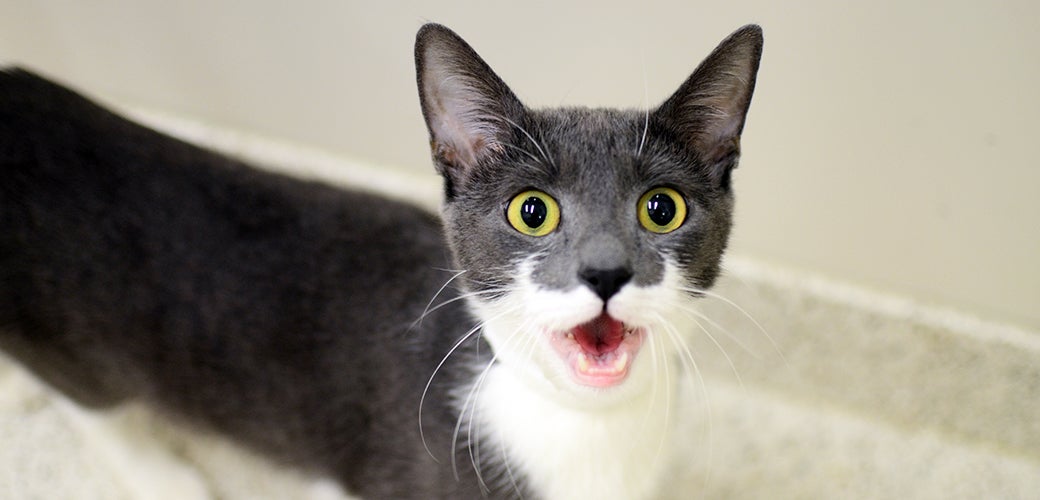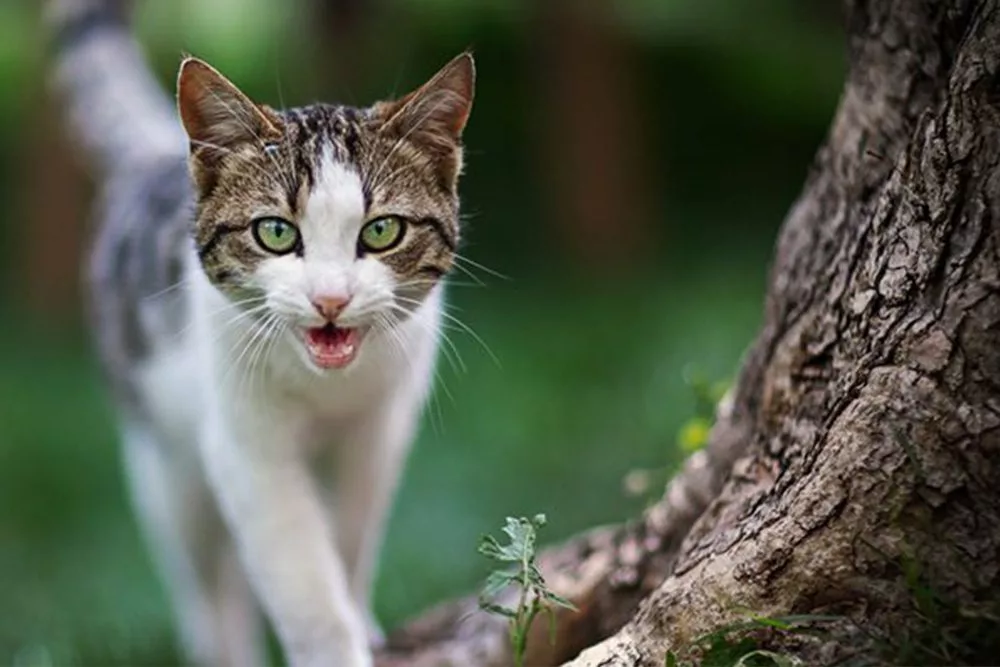Your cat may be meowing a lot due to various reasons, which can include hunger, boredom, stress, or seeking attention. Understanding the cause behind your cat’s excessive meowing is essential in addressing their needs and ensuring their overall well-being.
Cats are known for their vocal nature, using meows as a way of communication with their owners. While occasional meowing is normal, frequent and excessive meowing can be a sign of underlying issues. One common reason for excessive meowing is hunger.
Cats may meow persistently when they are hungry, especially if their feeding schedule has been disrupted. Ensuring that your cat is receiving regular, balanced meals can help alleviate this behavior. Another possible cause is boredom. Cats are active creatures, and when they lack stimulation or entertainment, they may resort to meowing excessively. Providing them with toys, scratching posts, and interactive playtime can help keep them engaged and reduce their meowing. Additionally, stress or anxiety can also lead to excessive meowing in cats. Changes in their environment, such as moving to a new home or the introduction of a new pet, can cause stress and trigger excessive meowing. Creating a calm and stable environment, along with providing comforting routines and spaces, can help alleviate their anxiety. Lastly, excessive meowing can be a way for your cat to seek attention. Cats are social animals and may meow to get your attention or to express their need for affection. Providing regular playtime, cuddles, and engaging with your cat can help fulfill their attention-seeking tendencies and reduce their meowing. Understanding the reason behind your cat’s excessive meowing is the key to finding an appropriate solution. By addressing their specific needs, you can help create a harmonious environment for both you and your feline companion.
Possible Medical Causes For Excessive Cat Meowing
Excessive cat meowing can be caused by various medical conditions. One possible cause is an overactive thyroid gland, known as hyperthyroidism. This condition occurs when the thyroid gland produces an excess of thyroid hormones, leading to increased vocalization in cats. Another medical cause of excessive meowing is a urinary tract infection (UTI). Cats with UTIs often exhibit frequent meowing and discomfort when urinating. Dental issues, such as tooth decay or gum disease, can also lead to increased vocalization as cats may be in pain or discomfort.
Behavioral Issues That Lead To Excessive Cat Meowing
The excessive meowing behavior in cats can be attributed to various behavioral issues. One common reason is attention-seeking behavior. Cats may meow excessively to gain attention from their owners. This behavior can be seen when the cat feels ignored or wants something.
Another behavioral issue that can lead to excessive meowing is anxiety and stress. Cats can become anxious or stressed due to various reasons such as changes in their environment, unfamiliar noises, or separation from their owners. This stress can manifest itself by the cat meowing excessively.
Additionally, cats may meow excessively due to loneliness or boredom. Cats are social animals and require mental and physical stimulation. Lack of interaction and enrichment can lead to boredom, resulting in excessive meowing.
Environmental Triggers That Cause Excessive Cat Meowing
Cats may meow excessively due to various environmental triggers. Changes in routine or environment can lead to increased vocalization in cats. Cats are creatures of habit, and any disruption to their daily routine or environment can cause anxiety and stress, resulting in excessive meowing.
Lack of mental stimulation can also contribute to increased meowing in cats. Cats need mental stimulation to keep them engaged and entertained. Without enough mental stimulation, they may resort to meowing to seek attention or alleviate boredom.
Inadequate resources, such as food, water, or litter boxes, can also lead to excessive meowing. Cats rely on these resources for their basic needs, and if they are lacking, they may vocalize to communicate their discomfort or dissatisfaction.
Consult A Veterinarian For Medical Evaluation
It is important to consult a veterinarian when your cat is meowing excessively, as it can be a sign of an underlying medical condition. Regular check-ups with a veterinarian are crucial to ensure your cat’s overall health and well-being.
- Regular veterinary check-ups help identify any potential health issues early on.
- Veterinarians can assess your cat’s meowing behavior and determine if it is within normal limits or if further investigation is required.
- Medical evaluations can help rule out any underlying medical conditions that may be causing excessive meowing.
- Veterinarians can provide appropriate treatment options based on the diagnosis, helping alleviate your cat’s excessive meowing.
- By consulting a veterinarian, you can ensure your cat receives the necessary care and attention it needs.
If an underlying medical condition is causing your cat to meow excessively, it is essential to follow the veterinarian’s recommended treatment plan. Medication, dietary changes, or behavior modifications may be prescribed to address the specific issue.
Remember, early detection and prompt treatment are key to addressing the root cause of your cat’s excessive meowing and restoring their health and happiness.
Ways To Address Behavioral Causes Of Excessive Cat Meowing
Ways to Address Behavioral Causes of Excessive Cat Meowing:
Excessive meowing in cats can be frustrating for pet owners, but understanding and addressing the underlying causes can help manage this behavior.
Providing Sufficient Playtime and Mental Stimulation: Cats are naturally curious and active animals. Lack of physical exercise and mental stimulation can lead to excessive meowing. Ensure your cat has enough playtime and provide toys that encourage mental stimulation, such as puzzle feeders or interactive toys. This can help divert their attention and reduce the need for constant meowing.
Establishing a Routine and Providing Consistency: Cats thrive on routine and predictability. Stick to a consistent feeding schedule and designate specific playtimes. This can help alleviate anxiety and reduce excessive meowing due to uncertainty or boredom.
Implementing Behavior Modification Techniques: If your cat’s excessive meowing persists, consult with a veterinarian or a professional animal behaviorist. They can suggest behavior modification techniques to address the underlying causes of the meowing, such as positive reinforcement training or environmental enrichment.

Credit: www.aspca.org
Creating A Stimulating Environment To Minimize Excessive Cat Meowing
Keeping your cat entertained and mentally stimulated is essential to prevent excessive meowing. By ensuring access to necessary resources, offering various toys and interactive games, and creating safe spaces for rest and relaxation, you can provide a stimulating environment for your cat.
| Ensuring Access to Resources: |
| 1. Provide clean food and fresh water bowls at accessible locations in your home. |
| 2. Maintain a clean and easily accessible litter box in a quiet area. |
| Offering Various Toys and Interactive Games: |
| 1. Offer a variety of toys such as feather wands, puzzle toys, and laser pointers to keep your cat engaged and entertained. |
| 2. Engage in interactive play sessions with your cat using wand toys or treat-dispensing toys. This helps fulfill their natural hunting instincts. |
| Creating Safe Spaces for Rest and Relaxation: |
| 1. Provide your cat with cozy hiding spots, cat beds, or elevated perches where they can retreat and feel safe. |
| 2. Use soft blankets or comfort items to create a calming environment for your cat’s relaxation. |
Conclusion
If your cat has been meowing excessively, it’s important to understand the possible reasons behind this behavior. It could be due to hunger, loneliness, or even a medical issue. As a responsible cat owner, taking the time to observe and analyze your cat’s behavior can provide insights into their needs.
Whether it’s ensuring they are fed adequately, providing companionship, or consulting with a veterinarian, addressing the underlying cause of excessive meowing is essential for your cat’s well-being.


